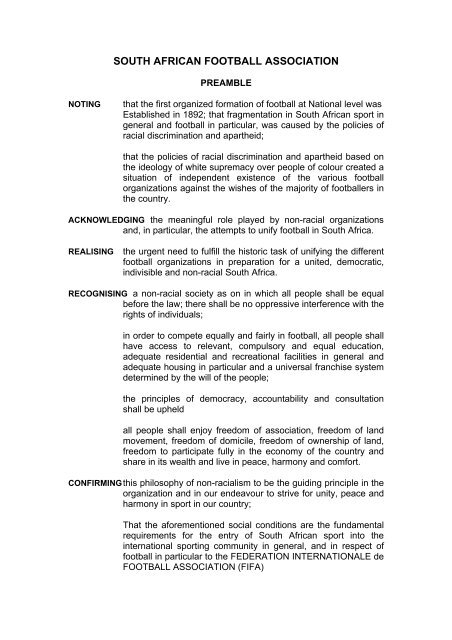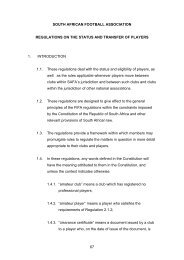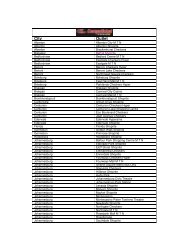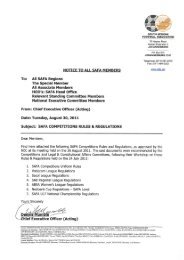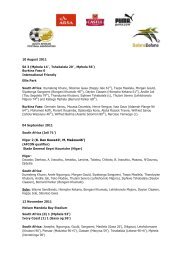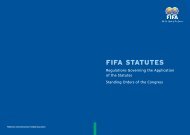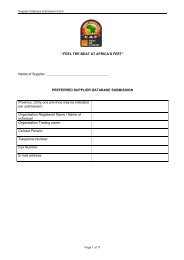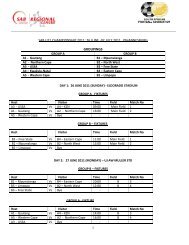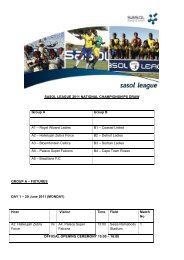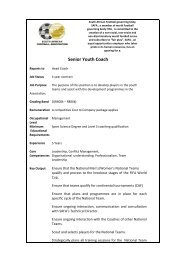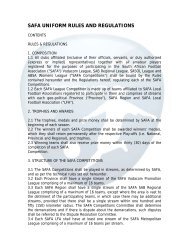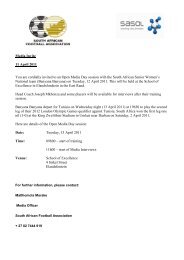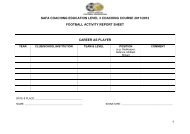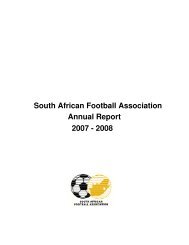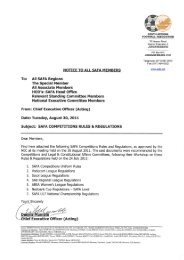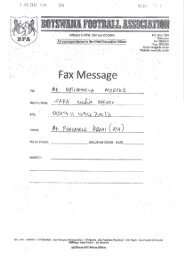SOUTH AFRICAN FOOTBALL ASSOCIATION
SOUTH AFRICAN FOOTBALL ASSOCIATION
SOUTH AFRICAN FOOTBALL ASSOCIATION
Create successful ePaper yourself
Turn your PDF publications into a flip-book with our unique Google optimized e-Paper software.
<strong>SOUTH</strong> <strong>AFRICAN</strong> <strong>FOOTBALL</strong> <strong>ASSOCIATION</strong><br />
PREAMBLE<br />
NOTING<br />
that the first organized formation of football at National level was<br />
Established in 1892; that fragmentation in South African sport in<br />
general and football in particular, was caused by the policies of<br />
racial discrimination and apartheid;<br />
that the policies of racial discrimination and apartheid based on<br />
the ideology of white supremacy over people of colour created a<br />
situation of independent existence of the various football<br />
organizations against the wishes of the majority of footballers in<br />
the country.<br />
ACKNOWLEDGING the meaningful role played by non-racial organizations<br />
and, in particular, the attempts to unify football in South Africa.<br />
REALISING the urgent need to fulfill the historic task of unifying the different<br />
football organizations in preparation for a united, democratic,<br />
indivisible and non-racial South Africa.<br />
RECOGNISING a non-racial society as on in which all people shall be equal<br />
before the law; there shall be no oppressive interference with the<br />
rights of individuals;<br />
in order to compete equally and fairly in football, all people shall<br />
have access to relevant, compulsory and equal education,<br />
adequate residential and recreational facilities in general and<br />
adequate housing in particular and a universal franchise system<br />
determined by the will of the people;<br />
the principles of democracy, accountability and consultation<br />
shall be upheld<br />
all people shall enjoy freedom of association, freedom of land<br />
movement, freedom of domicile, freedom of ownership of land,<br />
freedom to participate fully in the economy of the country and<br />
share in its wealth and live in peace, harmony and comfort.<br />
CONFIRMING this philosophy of non-racialism to be the guiding principle in the<br />
organization and in our endeavour to strive for unity, peace and<br />
harmony in sport in our country;<br />
That the aforementioned social conditions are the fundamental<br />
requirements for the entry of South African sport into the<br />
international sporting community in general, and in respect of<br />
football in particular to the FEDERATION INTERNATIONALE de<br />
<strong>FOOTBALL</strong> <strong>ASSOCIATION</strong> (FIFA)
RESOLVING to constitute the members of the <strong>SOUTH</strong> <strong>AFRICAN</strong> SOCCER<br />
<strong>ASSOCIATION</strong>, <strong>SOUTH</strong> <strong>AFRICAN</strong> SOCCER FEDERATION,<br />
<strong>FOOTBALL</strong> <strong>ASSOCIATION</strong> OF <strong>SOUTH</strong> AFRICA and the<br />
<strong>SOUTH</strong> <strong>AFRICAN</strong> NATIONAL <strong>FOOTBALL</strong> <strong>ASSOCIATION</strong> into<br />
an indissoluble single organization under the <strong>SOUTH</strong> <strong>AFRICAN</strong><br />
<strong>FOOTBALL</strong> <strong>ASSOCIATION</strong> and under the constitution hereby<br />
established to promote and control Association Football in<br />
<strong>SOUTH</strong> AFRICA.<br />
DEFINITIONS<br />
ARTICLES OF <strong>ASSOCIATION</strong><br />
In this Constitution, the Rules and Regulations, unless the context indicates<br />
otherwise,<br />
“Associate Member” means an associate member contemplated by<br />
Article 11.2;<br />
“CAF” means the Confederation Africane de Football;<br />
“CAF Statutes” or “Statutes of CAF” includes the statutes, rules and<br />
regulations of CAF;<br />
“Chief Executive Officer” means the Chief Executive Officer<br />
contemplated by Article 12.2.3;<br />
“Constitution” means these Articles of Association;<br />
“Constitution of the Republic” means the Constitution of the Republic of<br />
South Africa Act 108 of 1996;<br />
"COSAFA" means the Confederation of Southern African Football<br />
Associations;<br />
“LFA” means a Local Football Association contemplated by Article<br />
11.1.3;<br />
“executive office in SAFA” means the positions of President, Vice-<br />
Presidents, or member of the National Executive Committee;<br />
“FIFA” means the Federation Internationale de Football Association;<br />
“FIFA Statutes” or “Statutes of FIFA” includes the statutes, rules and<br />
regulations of FIFA;<br />
“foreign company” means a company registered outside the Republic of<br />
South Africa or controlled, directly or indirectly, by such a company or<br />
companies;<br />
2
“General Council” means the General Council of SAFA as contemplated<br />
by Article 12.1;<br />
“General Meeting” means an Annual General Meeting, a Special<br />
General Meeting or an Ordinary General Meeting;<br />
“League members of the National Executive Committee” means the 3<br />
members of the National Executive Committee appointed by the League<br />
in terms of Article 12.2.1(c);<br />
“League Vice President” means the Chairperson of the League, acting in<br />
his capacity as a Vice President of SAFA;<br />
“Management Committee” means the Management Committee<br />
contemplated by Article 12.3;<br />
“Member” means a Regional Member, Associate Member or the special<br />
member;<br />
“member in good standing” means a member which has complied with<br />
all obligations imposed upon members by the Constitution;<br />
“National Association” means a national football association affiliated to<br />
FIFA;<br />
“National Executive Committee” means the National Executive<br />
Committee contemplated by Article 12.2;<br />
“office-bearer” means the President, a Vice-President or any other<br />
member of the National Executive Committee;<br />
“ordinary Vice-President” means a Vice-President other than the League<br />
Vice-President;<br />
“Regional Member” means a Regional Member contemplated by Article<br />
11.1;<br />
“Regulations” means Regulations made in terms of the Constitution;<br />
“Rules” means Rules made in terms of the Constitution;<br />
"S.A.S.C.O.C. means the South African Sports Confederation and<br />
Olympic Committee;<br />
“SAFA” means the South African Football Association;<br />
“Special Member” means the National Soccer League or the League;<br />
3
NAME ARTICLE 1<br />
1.1 The Association hereby constituted shall be known as the South<br />
African Football Association and shall be abbreviated "SAFA".<br />
1.2 In this Constitution, the Association is referred to as “SAFA”.<br />
COLOURS AND EMBLEM ARTICLE 2<br />
2.1 The colours of SAFA shall be Black, Gold and White with Green, and<br />
the emblem shall be a portrayal of a football partly overlaid with a<br />
sphere depicting the map of South Africa.<br />
AREA OF JURISDICTION ARTICLE 3<br />
3.1 The area of jurisdiction of SAFA shall be the Republic of South Africa.<br />
HEADQUARTERS ARTICLE 4<br />
4.1 The headquarters of SAFA will be in Johannesburg.<br />
FOUNDER MEMBERS ARTICLE 5<br />
5.1 It is recorded that the founders of SAFA were the Soccer Association<br />
of South Africa and its professional wing The National Soccer League,<br />
the South African Soccer Federation and its professional wing The<br />
Federation Professional League, the South African National Football<br />
Association and its professional wing the National Professional<br />
Soccer League, and the Football Association of South Africa.<br />
DATE OF INCORPORATION ARTICLE 6<br />
6.1 The date of incorporation of SAFA was 23 March 1991.<br />
LEGAL PERSONALITY ARTICLE 7<br />
7.1 SAFA shall be a universitas with full legal personality including the<br />
rights to sue and be sued in its own name and to hold property in its<br />
own name.<br />
7.2 No member or office-bearer of SAFA shall have any right to its assets<br />
nor incur any liability for its obligations.<br />
AIMS AND OBJECTIVES ARTICLE 8<br />
SAFA shall have the following aims and objectives:<br />
8.1 To promote, advance, administer, co-ordinate and generally<br />
encourage the game of football in South Africa in accordance with the<br />
principles as laid down in the Statutes of FIFA.<br />
4
8.2 To consider and establish rules to control football in South Africa.<br />
8.3 To enforce the Laws of the Game as promulgated by FIFA from time<br />
to time and to protect the game against any form of abuse.<br />
8.4 To initiate, negotiate, arrange, finance and control tours and matches<br />
of teams to and from South Africa.<br />
8.5 To settle disputes arising between members or bodies or persons<br />
connected directly or indirectly with football within the jurisdiction of<br />
SAFA.<br />
8.6 To raise and administer the funds of SAFA in such a manner as SAFA<br />
may deem advisable and in particular by means of subscriptions,<br />
donations and sponsorships.<br />
8.7 To acquire and develop playing facilities including the construction of<br />
stadia.<br />
8.8 To affiliate to CAF, FIFA, SASCOC and COSAFA.<br />
8.9 To distribute monies to its members for the protection, promotion and<br />
advancement of amateur football.<br />
8.10 To do all such things as may be incidental or conducive to the<br />
attainment of the objectives or any one of them.<br />
POWERS OF THE <strong>ASSOCIATION</strong> ARTICLE 9<br />
Subject to Article 22 below, SAFA shall have the full power and authority to do<br />
any act, matter or thing as may be required to give effect to the aims and<br />
objectives of SAFA as described herein, including, but not limited to the<br />
following powers:-<br />
9.1 To engage staff on the basis of a policy of fair employment and equal<br />
opportunities, acquire assets and enter into commitments for the<br />
promotion of its aims and objectives<br />
9.2 To confer honours and awards on individuals, in recognition of their<br />
contribution to football in South Africa.<br />
9.3 To grant practical and financial assistance to individuals and<br />
organisations in order to enable them to promote ideas and concepts<br />
consistent with the objects of SAFA<br />
9.4 To enter into donor funding arrangements with companies or<br />
individuals and to solicit and accept fees, donations, bequests,<br />
contributions, and subscriptions for the funds of SAFA, provided<br />
5
however that SAFA shall ensure that no donor will derive any<br />
monetary advantage from any monies paid to and on behalf of SAFA.<br />
9.5 To take, lease, purchase or otherwise acquire premises, equipment,<br />
vehicles, furniture and other property or assets, whether movable or<br />
immovable which may be deemed necessary or convenient for any of<br />
the purposes of SAFA, and in order to provide suitable equipment,<br />
accommodation and facilities.<br />
9.6 To improve, manage, develop, exchange or lease, mortgage, sell,<br />
dispose of, turn to account and grant options, rights and privileges in<br />
respect of, or otherwise deal with, all or any part of the property and<br />
rights of SAFA.<br />
9.7 Subject to Article 10.6 below, to subscribe, grant subsidies out of,<br />
administer and invest the funds of SAFA in such manner as it may be<br />
deemed best to achieve the objects and purposes of SAFA.<br />
9.8 To borrow, or raise money in such a manner as SAFA shall deem fit,<br />
and in particular to secure payment of any money borrowed by means<br />
of mortgage, pledge, charge or lien to secure and guarantee the due<br />
performance by SAFA of any obligation or liability it may undertake.<br />
9.9 To open and operate banking accounts and to draw, make, accept,<br />
endorse, sign, discount, execute, issue cheques, promissory notes,<br />
bills of exchange, bills of lading, warrants, debentures and other<br />
negotiable documents.<br />
9.10 To make rules which shall not be inconsistent with the terms of this<br />
Constitution. The Rules of SAFA shall have the same force and effect<br />
as if they were incorporated in the Articles of the Constitution.<br />
9.11 To select teams for International and Representative matches at all<br />
levels and to arrange tours and to sanction matches in and regulate<br />
the transfer of players to and from the Republic of South Africa in<br />
terms of the FIFA Regulations.<br />
9.12 To keep or cause to be kept, true accounts of all receipts, credits,<br />
payments, assets and liabilities of SAFA and all other matters<br />
necessary for showing the correct financial state of affairs of SAFA.<br />
The accounts shall be kept in such books and in such manner as the<br />
National Executive Committee deems fit and to the satisfaction of the<br />
Auditors of SAFA.<br />
9.13 To appoint auditors to audit annual accounts of SAFA.<br />
9.14 To inquire into the administrative and/or financial affairs of Members,<br />
and, where necessary, to recommend corrective measures in this<br />
regard, and if these measures are not implemented to take over the<br />
6
administrative and/or financial affairs of the Member until these are<br />
placed on a satisfactory footing.<br />
9.15 To appoint such sub-committees or commissions upon such terms as<br />
it may consider necessary to give effect to its powers.<br />
9.16 To suspend, fine, terminate the membership of or otherwise deal with<br />
any Member, District Association, Club or individual affiliated to SAFA<br />
or any of its Members for infringing the Constitution, policies,<br />
principles or resolutions of SAFA or for engaging in acts of<br />
misconduct, improper practices, misdemeanour, acts of defiance, or<br />
for bringing SAFA into disrepute.<br />
FINANCE ARTICLE 10<br />
10.1 SAFA shall be conducted on a non-profit basis, with the intent and<br />
purpose that its capital and income, shall be applied solely towards<br />
the promotion of its objects, and no portion thereof shall be paid or<br />
transferred directly or indirectly, (whether by salary, dividend, bonus<br />
or otherwise howsoever) by way of profit or distribution to any of the<br />
Members of SAFA or their office bearers or members, provided that<br />
nothing herein contained shall preclude the payment in good faith to a<br />
Member or any other person of:-<br />
10.1.1 reasonable remuneration for the services actually rendered<br />
for or on behalf of SAFA;<br />
10.1.2 reimbursement of actual costs, expenses and other<br />
commitments incurred on behalf of SAFA;<br />
10.1.3 payment of gratuity and/or pension on the retirement of any<br />
person who previously shall have been in the employ of<br />
SAFA;<br />
10.1.4 payment of honoraria to members of the National Executive<br />
Committee on a basis to be determined and approved by<br />
the Annual General Meeting.<br />
10.2 The financial year of SAFA shall close on 30 June in each year.<br />
10.3 The signatories shall be any two of the five (5) duly authorised by<br />
SAFA.<br />
10.4 The financial resources of SAFA shall include, but not be limited to:-<br />
10.4.1 Annual subscription fees of Members;<br />
10.4.2 National competition entry fees;<br />
7
10.4.3 Player Registration fees;<br />
10.4.4 Donations, subject to section 30(3)(b)(v) of the Income Tax<br />
Act 58 of 1962;<br />
10.4.5 Loans;<br />
10.4.6 State grants;<br />
10.4.7 Returns on investments;<br />
10.4.8 Interest on loans;<br />
10.4.9 Proceeds of sales of assets.<br />
10.4.10 Radio and electronic broadcasting rights.<br />
10.5 SAFA may invest its funds only<br />
10.5.1 with a financial institution as defined in section 1 of the<br />
Financial Institutions (Investment of Funds) Act 39 of 1984,<br />
10.5.2 in securities listed on a licensed stock exchange as defined in<br />
the Stock Exchanges Control Act 1 of 1985,<br />
10.5.3 in any other prudent investments covered by section<br />
30(3)(b)(ii)(cc) of the Income Tax Act 58 of 1962<br />
10.6 Notwithstanding Article 10.5, SAFA may retain any investment which<br />
is donated or bequeathed to it in the form that it was so donated or<br />
bequeathed, provided that SAFA may not retain any investment in the<br />
form of a business undertaking or trading activity or of an asset which<br />
is used in a business undertaking or trading activity<br />
10.7 SAFA may not carry on any business undertaking or trading activity<br />
otherwise than to the extent that<br />
10.7.1 the undertaking or activity is<br />
(a)<br />
integral and directly related to the objects of SAFA, and<br />
(b) carried out or conducted on a basis substantially the<br />
whole of which is directed towards the recovery of cost<br />
and which would not result in unfair competition in<br />
relation to taxable entities; or<br />
10.7.2 if the undertaking or activity is not integral and directly related<br />
to the objects of SAFA, it should be of an occasional nature<br />
and undertaken on a voluntary basis without compensation.<br />
8
COMPOSITION AND MEMBERSHIP ARTICLE 11<br />
The Members of SAFA shall consist of the following:<br />
11.1 Regional Members<br />
11.1.1 There shall be fifty-two (52) regional members, categorized as<br />
follows:<br />
(a)<br />
Regions:<br />
(i)<br />
In the Province of Western Cape (Cape Town)<br />
- West Coast (Malmesbury)<br />
- Boland (Stellenbosch)<br />
- Overberg (Swellendam)<br />
- Eden (George)<br />
- Central Karoo (Beaufort West)<br />
- Cape Town Unicity (Cape Town)<br />
(ii)<br />
In the Province of Northern Cape (Kimberley)<br />
- Namakwa (Springbok)<br />
- Pixley-ka-Seme (De Aar)<br />
- Siyanda (Upington)<br />
- Kgalagadi (Kathu)<br />
- Frances Baard (Kimberley)<br />
(iii)<br />
In the Province of the Eastern Cape (Bisho)<br />
- Cacadu (Grahamstown)<br />
- Amathole (East London)<br />
- Chris Hani (Queenstown)<br />
- Ukhahlamba (Aliwal North)<br />
- O R Tambo (Umtata)<br />
9
- Alfred Nzo (Mount Ayliff)<br />
- Nelson Mandela (Port Elizabeth)<br />
(iv)<br />
In the Province of Free State (Bloemfontein)<br />
- Xhariep (Trompsberg)<br />
- Motheo (Bloemfontein)<br />
- Lejweleputswa (Welkom)<br />
- Thabo Mofutsanyana (Phuthaditjhaba)<br />
- Fezile Dabi (Kroonstadt)<br />
(v)<br />
In the Province of Kwazulu-Natal (Pietermaritzburg)<br />
- Ugu (Port Shepstone)<br />
- Umgungundlovu (Pietermaritzburg)<br />
- Uthukela (Ladysmith)<br />
- Umzinyathi (Dundee)<br />
- Amajuba (Newcastle)<br />
- Zululand (Ulundi)<br />
- Umkhanyakude (Mtubatuba)<br />
- UThungulu (Richards Bay)<br />
- iLembe (Kwa Dukuza)<br />
- Sisonke (Ixopo)<br />
- Ethekwini (Durban)<br />
(vi)<br />
In the Province of Mpumalanga (Nelspruit)<br />
- Gert Sibande (Standerton)<br />
- Nkangala (Witbank)<br />
10
- Ehlanzeni (Nelspruit)<br />
(vii)<br />
In the Province of Limpopo (Polokwane)<br />
- Mopani (Giyani)<br />
- Vhembe (Thohoyandou)<br />
- Capricorn (Polokwane)<br />
- Waterberg (Bela-bela)<br />
- Sekhukhune (Groblersdal)<br />
(viii)<br />
In the Province of North West (Mafikeng)<br />
- Bojanala (Rustenberg)<br />
- Central (Mafikeng)<br />
- Bophirima (Vryburg)<br />
- Southern (Klerksdorp)<br />
(ix)<br />
In the Province of Gauteng (Johannesburg)<br />
- Sedibeng (Vereeniging)<br />
- Johannesburg (Johannesburg)<br />
- Ekurhuleni (Germiston)<br />
- Metsweding (Bronkhorspruit)<br />
- Tshwane<br />
- West Rand<br />
11.1.2 Each regional member must be a representative unit for<br />
amateur football within its respective region.<br />
11.1.3 Where the footballing activities of a regional member are<br />
organized on local level, the constitution of the relevant<br />
regional members shall provide for recognition and<br />
representation of the Local Football Association which are<br />
representative units of respective localities in accordance with<br />
11
11.2 Associate Members<br />
11.2.1 The following associations are recognized as Associate<br />
Members:<br />
(a) South African Football Medical Association<br />
(b) South African Students Sports Union (Football)<br />
(c) South African Football Coaches Association<br />
(d) South African Schools Football Association<br />
(e) South African National Defense Force (Football)<br />
(f) South African Masters Football Association<br />
(g) South African Industrial League<br />
(h) South African Deaf Association<br />
11.2.2 SAFA may, by a majority vote taken at an Annual General<br />
Meeting or a Special General Meeting convened inter alia for<br />
this purpose, grant associate membership status to any other<br />
association operating on a national level provided that no<br />
associate membership shall be granted to an association with<br />
the same aims and objectives as SAFA.<br />
11.2.3 SAFA may, by a two-thirds majority vote taken solely for this<br />
purpose, withdraw its recognition of any associate member<br />
contemplated by paragraphs 11.2.1 or 11.2.2 above, in which<br />
event; the relevant association will cease, forthwith, to be an<br />
associate member of SAFA.<br />
11.2.4 In matters of mutual interest, SAFA and any members shall<br />
enter into a written agreement covering issues such as a joint<br />
liaison committee, selection of the national team,<br />
communication, leagues whether national or otherwise,<br />
compensation, levies, disputes, referees, coaches and the<br />
like.<br />
11.3 The Special Member<br />
11.3.1 The National Soccer League, incorporating the Premier<br />
Soccer League and the 1 st Division shall be a Special Member<br />
and shall hereafter be referred to as "the League" as defined<br />
in the FIFA Statutes.<br />
11.3.2 Subject to Articles 11.5.1 and 11.5.2 the rights, powers and<br />
obligations of the National Soccer League shall be as set out<br />
in this Constitution and in the NSL Handbook or any<br />
amendment thereof.<br />
12
11.4 Honorary Membership and Life Membership<br />
11.4.1 The General Council, on the proposal of the Executive<br />
Committee, may grant the titles of Honorary Member or Life<br />
Member to a person or persons who has rendered meritorious<br />
service to SAFA.<br />
11.4.2 The Honorary President or Life Member shall attend the<br />
General Council Meeting and the Executive Committee<br />
Meetings without the right to vote.<br />
11.4.3 Honorary Members or Life Member shall attend in the<br />
discussions of the General Council Meetings without the right<br />
to vote.<br />
11.5 Requirements for Memberships<br />
No association or league will be eligible to acquire or to retain<br />
membership of SAFA unless:<br />
11.5.1 It has a constitution which provides for:<br />
(a) open elections to be held at intervals of not more than four<br />
(4) years; as well as holding Annual General Meetings for<br />
the membership.<br />
(b) regular audited financial statements to be presented to its<br />
membership on an annual basis.<br />
(c) file a declaration that it will always comply with the<br />
Constitution, Statutes, Regulations and decisions of SAFA,<br />
CAF and FIFA and ensure that these are also observed<br />
and respected by its members, clubs, officials and players.<br />
(d) file a declaration that it recognizes the Court of Arbitration<br />
(CAS) in Lausanne, as specified in this Constitution.<br />
(e) file a declaration to the effect that the member guarantees<br />
that it can make decisions independently of any external<br />
entity.<br />
(f) file a copy of the minutes of every Annual General Meeting<br />
within 90 days after the meeting.<br />
11.5.2 It has complied fully with such provisions of its constitution<br />
and has provided proof of such compliance to SAFA.<br />
13
11.6 Subordinate Status of Members<br />
Members shall be subordinate to SAFA and must comply with this<br />
constitution, the Regulations and any directive issued by SAFA.<br />
11.6.1 No amendments to the Constitution or Rules of any member<br />
shall be of any force and effect and until the National<br />
Executive of SAFA has ratified it.<br />
11.6.2 No provision of the Constitution or Rules of a member or any<br />
amendment thereof which conflicts with a provision of this<br />
Constitution, the Statutes of CAF or FIFA shall be of any force<br />
and effect, irrespective of whether or not it has been ratified<br />
by the National Executive Committee.<br />
11.7 Membership matters to be Regulated in the Rules<br />
The Rules may regulate any matters relating to Membership, including<br />
but not limited to the following matters:<br />
11.7.1 The procedure for affiliation of members;<br />
11.7.2 The colours and emblems of regional members;<br />
11.7.3 The membership fees and subscriptions to be paid by<br />
members;<br />
11.7.4 The obligations of members with respect to financial<br />
statements and books of accounts; and<br />
11.7.5 The grounds on which members may be suspended from<br />
SAFA.<br />
11.8 Rights of Members<br />
11.8.1 To participate in the General Council of SAFA, to receive<br />
agenda in advance, to receive notices of General Council<br />
Meetings within the prescribed time and to exercise their<br />
voting rights.<br />
11.8.2 To draw up proposals for inclusion in the agenda of the<br />
General Council<br />
11.8.3 To nominate candidates for all bodies of SAFA to be elected<br />
and appointed.<br />
11.8.4 To be informed of the affairs of SAFA through the official<br />
structures of SAFA.<br />
14
11.8.5 To participate in competitions (wherever relevant) and other<br />
activities organized by SAFA.<br />
11.8.6 To exercise all of the rights arising from the Constitution,<br />
Rules and Regulations of SAFA, subject to other provisions in<br />
this Constitution and applicable regulations.<br />
11.9 Responsibility of Members<br />
11.9.1 Regions, local football associations, associates members and<br />
special members – their clubs, officials, and employees shall<br />
respect the principles of loyalty, integrity and sportsmanship<br />
recognized by SAFA, CAF and FIFA.<br />
11.9.2 Regions, local football associations, associate members and<br />
special members and clubs are responsible for the conduct of<br />
their players, officials, members and supporters and any other<br />
person exercising an official function at a match or event<br />
sanctioned by the Association or any of its affiliates.<br />
11.10 Suspension of Members<br />
11.10.1 SAFA shall have the right to impose the suspension of<br />
members, their affiliates and officials / players subject to a<br />
due process of the Disciplinary Committee.<br />
11.10.2 A suspended member / affiliate / official shall temporarily lose<br />
his / hers/ its membership rights. Other members may not<br />
entertain any sporting or official contact with a suspended<br />
member.<br />
11.10.3 SAFA shall recognize the suspension of members imposed<br />
at other levels of the organization.<br />
11.11 Expulsion of Members<br />
11.11.1 SAFA may expel a member, its affiliate / official / player if the<br />
Disciplinary Committee renders a verdict of repeated<br />
violations of the constitutional obligations and breaches of<br />
regulations, directives or decisions of SAFA, CAF or FIFA.<br />
GOVERNING BODIES ARTICLE 12<br />
12.1 General Council (GC)<br />
12.1.1 The General Council (GC) shall be the supreme decision<br />
making body of the Association and shall comprise all office<br />
bearers and duly appointed delegates of members, meeting at<br />
15
the occasion of the Annual General Meeting (AGM), General<br />
Meeting (GM) and/or Special General Meeting (SGM).<br />
12.1.2 The General Council shall also monitor the activities of the<br />
commercial entity and shall agree on the mandate of the<br />
member appointed in terms of Article 14.7.12 hereunder to<br />
represent the Association as shareholder at the Annual<br />
General meeting of the commercial entity.<br />
12.1.3 Governing Council.<br />
The Chief Executive Officer shall prepare the agenda of the<br />
General council Meeting based on proposals from the<br />
Executive Committee and the members. Any proposal that a<br />
member wishes to submit to the General Council shall be sent<br />
in writing, with a brief explanation at least 30 days prior to the<br />
date of the General Council Meeting.<br />
12.2 National Executive Committee<br />
12.2.1 The National Executive Committee shall comprise the<br />
following office bearers:-<br />
(i)<br />
(j)<br />
The President<br />
Three (3) Vice-Presidents, one of whom shall be the<br />
Chairperson of the League and who shall not be eligible<br />
to hold any other Executive Office within the Association.<br />
(k) Eighteen (18) additional National Executive Members,<br />
six (6) of whom shall be elected from a National List,<br />
nine (9) of whom shall be elected from a Provincial List<br />
and three (3) of whom shall be appointed by the League.<br />
12.2.2 The members of the National Executive Committee shall be<br />
elected in terms of Article 13 below and shall hold office for a<br />
term of 4 years. All National Executive Members shall be<br />
eligible for re-election and shall retain Office until their<br />
successors have been elected.<br />
1)<br />
2)<br />
12.2.3 The Chief Executive Officer, who shall be employed by SAFA<br />
on such terms as it deems fit, shall be an ex officio member of<br />
the National Executive Committee, but shall have no voting<br />
rights at meetings of the National Executive Committee.<br />
(a) The Chief Executive Officer shall be appointed on the<br />
basis of an agreement governed by the labour law, and<br />
shall have the necessary qualifications.<br />
(b) The Chief Executive Officer shall be the Accounting<br />
Officer for the Association.<br />
16
3)<br />
4)<br />
5)<br />
6)<br />
(c) The Chief Executive Officer shall be responsible for<br />
implementing Resolutions of the General Council and<br />
National Executive Committee in accordance with the<br />
Constitutional imperatives.<br />
(d) The Chief Executive Officer shall organise and attend<br />
all General Council, Executive Committee, Standing<br />
and Ad Hoc Committee Meetings, where possible.<br />
(e) The Chief Executive Officer shall be responsible for the<br />
management of the correspondence of the Association.<br />
(f) The Chief Executive officer shall be responsible for the<br />
appointment and management of all staff of the<br />
Association.<br />
12.2.4 Powers and duties of the National Executive Committee<br />
(a)<br />
To appoint the following standing committees which shall<br />
consist of a Chairperson who shall be a member of the<br />
National Executive Committee and such other members<br />
as are deemed necessary:<br />
(i) Technical Committee<br />
(ii) Youth and Development Committee<br />
(iii) National Referees’ Committee<br />
(iv) Women’s Football Committee<br />
(v) Finance and Administration Committee<br />
(vi) Legal and Constitutional Affairs Committee<br />
(vii) Medical Committee<br />
(viii) Joint Liaison Committee<br />
(ix) Security, Protocol and Fair Play Committee<br />
(x) Provincial Affairs Committee<br />
(xi) Competitions Committee<br />
(xii) Indoor Football<br />
(xiii) Beach Football<br />
(b)<br />
To appoint the following judicial committees:<br />
(i)<br />
National Appeal Board<br />
17
a) The National Appeal Board which shall<br />
consist of at least 5 members provided that<br />
the Chairman and Vice-Chairman shall be<br />
legal practitioners. Three members shall<br />
form a quorum.<br />
b) The function of this body shall be governed<br />
by the Disciplinary Code of SAFA, CAF and<br />
FIFA.<br />
c) The Appeal Board shall be responsible for<br />
hearing appeals against decisions of any<br />
Disciplinary Committee, including the NSL<br />
Disciplinary Committee, or any Dispute<br />
Resolution Committee or an appeal against<br />
administrative action on the part of SAFA<br />
or any of its members and/or their affiliates.<br />
d) The National Appeal Board shall on<br />
application by any member of SAFA or<br />
members of affiliates of SAFA, have the<br />
power to review any decision made by any<br />
structure of SAFA.<br />
e) The Appeal Board shall have the power to<br />
vary any decision properly placed before it,<br />
whether under review or appeal.<br />
(ii)<br />
National Disciplinary Committee<br />
a) The National Disciplinary Committee shall<br />
consist of at least 5 members, provided the<br />
Chairman and Vice-Chairman shall have<br />
legal qualifications. Three members shall<br />
form a Quorum.<br />
b) The function of this body shall be governed<br />
by the Disciplinary Code of SAFA, CAF and<br />
FIFA.<br />
18
c) The Committee may pronounce sanctions<br />
described in this constitution and<br />
Disciplinary Code of SAFA, CAF and FIFA<br />
on members, officials, players, clubs, and<br />
player agents.<br />
(iii)<br />
Dispute Resolution Committee<br />
a) The Dispute Resolution Committee (DRC)<br />
shall consist of at least 5 members,<br />
provided that the Chairman and Vice-<br />
Chairman shall have legal qualifications.<br />
b) The DRC shall deal with all football-related<br />
disputes, not provided for in the Disciplinary<br />
Code, between SAFA and its members,<br />
affiliates of members, players, officials and<br />
player agents that do not fall under the<br />
jurisdiction of the judicial bodies.<br />
(c)<br />
To appoint sub-committees;<br />
(d) By Regulation to assign any functions to a standing<br />
committee.<br />
(e) Subject to the Constitution, Rules and Regulations, to<br />
delegate any of its powers to the management<br />
committee, a standing committee, judicial committee or<br />
sub-committee.<br />
(f)<br />
To approve the budget and all intended expenditure of<br />
SAFA.<br />
(g) To enact, repeal and amend the Regulations of SAFA,<br />
provided that<br />
(i)<br />
the National Executive Committee may make no<br />
regulation which is inconsistent with this<br />
Constitution, and<br />
(ii) any regulation made by the National Executive<br />
Committee shall be tabled at the next Annual<br />
General Meeting of SAFA and will be of no force<br />
and effect beyond the date of that Annual General<br />
19
Meeting unless it is ratified at that Annual General<br />
Meeting.<br />
12.2.5 The National Executive Committee shall meet at least once<br />
every two (2) months.<br />
12.2.6 Minutes of all National Executive Committee Meetings shall<br />
be distributed to members of the Committee within twenty one<br />
(21) days of such meeting.<br />
12.2.7 A summary of decisions taken at National Executive<br />
Committee Meetings shall be distributed to the Members of<br />
SAFA once every two (2) months.<br />
12.2.8 The National Executive Committee shall ensure that Minutes<br />
of any General Meetings are distributed to the Members of<br />
SAFA within twenty-one (21) days of the meeting in question.<br />
12.3 Management Committee<br />
12.3.1 The Management Committee shall comprise<br />
(a)<br />
(b)<br />
(c)<br />
(d)<br />
The President,<br />
The Three Vice-Presidents,<br />
One Additional Member of the National Executive<br />
nominated by the National Executive Committee<br />
The Chief Executive Officer<br />
12.3.2 The Management Committee shall deal with all matters<br />
requiring immediate decision between meetings of the<br />
National Executive Committee<br />
12.3.3 The business of the Management Committee shall ordinarily<br />
be conducted at specially convened meetings, provided that<br />
in exceptional circumstances, if it is not practical to convene a<br />
meeting of the Management Committee, decisions may be<br />
reached by means of written communication, in which case<br />
the National Executive Committee shall be notified<br />
immediately.<br />
12.3.4 All decisions taken by the Management Committee shall be<br />
implemented immediately but must be tabled for ratification<br />
by the National Executive Committee at its next meeting.<br />
12.4 Provincial Executive Council<br />
Each province may elect a provincial executive council comprising of:<br />
20
12.4.1 the chairperson who shall be a national executive<br />
member representing the province;<br />
12.4.2 national executive member/s in the province;<br />
12.4.3 the president of each region;<br />
12.4.4 the representative of South African Schools Football<br />
Association;<br />
12.4.5 a representative of SASSU Football in the province;<br />
12.4.6 the provincial secretary (employed on terms and<br />
conditions);<br />
12.5 Powers of the Provincial Executive Council<br />
Each of the recognised provincial councils shall have the following<br />
rights and duties:<br />
12.5.1 to comply with and enforce compliance with the SAFA<br />
Constitution, Rules and Regulations;<br />
12.5.2 to co-operate with SAFA in all matters relating to the<br />
organization of provincial competitions and football in<br />
general;<br />
12.5.3 to organize its own provincial, regional and/or local<br />
competitions;<br />
12.5.4 to elect, as the provinces representatives, provincial<br />
members to the SAFA Executive Committee in terms of<br />
Article 12.2;<br />
12.5.5 to ensure that representatives it has appointed to the<br />
SAFA structures and elected to the executive committee,<br />
exercise this function with due respect and attention;<br />
12.5.6 to appoint committees which will work in close cooperation<br />
with the corresponding SAFA committees;<br />
12.5.7 generally to take all action it deems useful to encourage<br />
the development of football by organizing seminars,<br />
courses, etc.;<br />
12.5.8 to procure the funds required to fulfil its duties<br />
adequately.<br />
ELECTIONS OF OFFICERS ARTICLE 13<br />
21
13.1 Subject to the provisions of this Article, the election of office-bearers<br />
shall be by vote of delegates and office-bearers present at a<br />
Quadrennial Annual General Meeting of SAFA.<br />
13.2 Only representatives of Members in good standing shall be eligible for<br />
election as an office bearer or member of the National Executive<br />
Committee.<br />
13.3 Each delegate and office-bearer present at the election AGM shall<br />
have one vote in any election of office bearers, provided that no<br />
delegate shall be entitled to vote unless the Member which he/she<br />
represents is a Member in good standing.<br />
13.4 Any Member in good standing shall be entitled to submit nominations<br />
for the President, the two Vice-Presidents other than the League Vice-<br />
President and the National List of candidates for election.<br />
13.5 Only Regional Members shall be entitled to submit nominations from<br />
their Province to the Provincial List of candidates for election.<br />
13.6 Sixty (60) days prior to the date of the Annual General Meeting the<br />
Chief Executive Officer shall distribute nomination forms to Members<br />
per registered post.<br />
13.7 Members shall submit the original nomination forms to SAFA's auditor<br />
such that they are received at least thirty (30) days prior to the date of<br />
the Annual General Meeting. The closing date and time shall be<br />
specified in a circular distributed by the Chief Executive Officer with<br />
the nomination forms.<br />
13.8 No nomination form will be accepted by SAFA unless:-<br />
13.8.1 The nomination form is signed by the President/Chairperson<br />
and the Secretary of the Member submitting the nomination;<br />
and<br />
13.8.2 The nominee has submitted to the auditor his signed<br />
acceptance of the nomination on the form provided for this<br />
purpose, or on a copy or facsimile thereof, and this signed<br />
acceptance has been received by the auditor at least thirty<br />
(30) days prior to the date of the Annual General Meeting.<br />
13.9 The onus shall be on the Member concerned to ensure that<br />
nominations and acceptances are received by the auditor on or before<br />
the closing date.<br />
13.10 Within seven (7) days after the closing date for nominations, the<br />
auditor shall submit a list of those persons properly nominated to the<br />
Chief Executive Officer. The original nomination forms shall be<br />
retained by the auditor.<br />
22
13.11 The Chief Executive Officer shall send the list of nominations as<br />
received from the auditor to all Members along with the agenda for the<br />
Annual General Meeting.<br />
13.12 Prior to the commencement of the elections, the meeting shall elect<br />
an electoral officer and two other persons who are not candidates for<br />
office, to conduct the elections.<br />
13.13 Should there be fewer nominations for a post than there are<br />
vacancies to be filled nominations may be made from the floor. In<br />
such event no nomination will be accepted unless the nominee in<br />
question is present at the Annual General Meeting and indicates<br />
his/her willingness to accept nomination.<br />
13.14 The first person to be elected shall be the President. Should only one<br />
nomination be received the candidate shall be declared duly elected<br />
unless delegates drawn from at least four (4) members request a<br />
ballot. In such event, delegates shall vote either "for" or "against" the<br />
candidate. Should the candidate not poll a majority of the votes, fresh<br />
nominations shall be taken from the floor. Where more than one<br />
nomination is received, the election shall take place by simple majority<br />
vote. In the event of a tie, the outgoing President (or if he is a<br />
candidate, an outgoing Office Bearer nominated for this purpose by<br />
the outgoing National Executive Committee) shall have a casting vote<br />
in addition to his/her deliberative vote.<br />
13.15 Following the election of the President, the two ordinary Vice-<br />
Presidents shall then be elected. Should only two nominations be<br />
received, the candidates shall be declared duly elected. Should more<br />
than two nominations for these positions be received, then such<br />
nominations will be determined by means of a ballot with the two<br />
candidates polling the most number of votes elected to the position of<br />
Vice-Presidents. In the event of the election not yielding two<br />
candidates who poll more votes than any of the other candidates,<br />
13.15.1 if one candidate polled the highest number votes, s/he will be<br />
elected Vice-President and there will be a second ballot in<br />
respect of all candidates who polled the second highest<br />
number of votes. The second election will take place by<br />
plurality vote with the President having a casting vote in<br />
addition to his/her deliberative vote in the event of a tie;<br />
13.15.2 if no single candidate polled the highest number of votes,<br />
there will be a second ballot in respect of all candidates who<br />
polled the highest number of votes, with the two candidates<br />
polling the highest number of votes elected to the position of<br />
Vice-President. If the second ballot does not yield two<br />
candidates who poll more votes than any of the other<br />
candidates, the President will have a casting vote or votes as<br />
23
the case may be in addition to his/her deliberative vote,<br />
provided that if there is any candidate who polled more votes<br />
than any of the remaining candidates in the second ballot, the<br />
President will be obliged to exercise one of his/her casting<br />
votes in favour of that candidate.<br />
13.16 Following the election of the two ordinary Vice Presidents, the<br />
President shall announce the names of the League Vice President<br />
and the League members of the National Executive Committee.<br />
13.17 Thereafter six (6) additional National Executive Members from the<br />
National List using a single round of voting, with the six (6) candidates<br />
pulling the highest number of votes being elected. Where only six (6)<br />
nominations are received, the nominated candidates shall be declared<br />
duly elected. Delegates may vote for a maximum of six (6)<br />
candidates, but may vote for less than six (6). In the event of a tie<br />
affecting the result of the election, the President shall exercise a<br />
casting vote or votes in addition to his/her deliberative vote.<br />
13.18 Should any dispute relating to an election arise during or the meeting,<br />
the electoral officer shall rule thereon, and his/her ruling shall be final<br />
and may not be challenged by any candidate, delegate or Member.<br />
13.19 Subject to the provisions of this Article, Office Bearers hold office until<br />
their successors have been elected at a Quadrennial Annual General<br />
Meeting.<br />
13.20 A vacancy in any office of the National Executive Committee shall<br />
occur:-<br />
13.20.1 upon the death or resignation of a member;<br />
13.20.2 If a member is absent from three (3) consecutive meetings of<br />
the National Executive Committee without prior permission<br />
unless the National Executive Committee upon good cause<br />
being shown, otherwise decides;<br />
13.20.3 If a member is found guilty of having conducted himself in any<br />
manner likely to prejudice the objects or activities of SAFA<br />
and/or whose conduct has the effect of bringing SAFA into<br />
disrepute;<br />
13.21 Should the office of any member of the National Executive Committee<br />
become vacant, the remaining members of the National Executive<br />
Committee shall have the power to co-opt a member in his place until<br />
the next Annual General Meeting provided that should the office of the<br />
President become vacant, the National Executive shall, at its next<br />
meeting, elect one of the two Vice-Presidents other than the League<br />
Vice President to act as President until the next Annual General<br />
Meeting.<br />
24
13.22 At any Annual General Meeting which is not a Quadrennial Annual<br />
General Meeting, elections will be held to fill offices vacated during<br />
the previous year. Candidates for such elections may be nominated<br />
only in accordance with the nomination procedures of this Article. In<br />
each category of Office Bearer in respect of which there are<br />
vacancies, delegates may vote for as many candidates as there are<br />
vacancies with the required number of candidates who obtain the<br />
highest number of votes in the first round of voting being elected. In<br />
the event of a tie, the tie-break mechanisms set out in this Article for<br />
the relevant category of Office Bearer will apply.<br />
13.23 An office bearer elected in accordance with Article 13.22 to fill a<br />
vacancy on the National Executive Committee holds office until the<br />
next Quadrennial Annual General Meeting.<br />
13.24 The President and Chief Executive Officer shall not serve on the<br />
Executive body of any Member.<br />
ANNUAL GENERAL MEETING ARTICLE 14<br />
14.1 The Chief Executive Officer shall, by registered post or telefax, give all<br />
Members at least ninety (90) days advance notice of the date of the<br />
Annual General Meeting, which date shall, subject to Article 14.1, be<br />
determined by the National Executive Committee and shall ordinarily<br />
be a date in September.<br />
14.2 If, by 30 June in any year, no date for an Annual General Meeting has<br />
been fixed by the National Executive Committee, until the date of the<br />
Annual General Meeting is fixed, any Member may by written notice to<br />
the Chief Executive Officer nominate a date for the Annual General<br />
Meeting between 100 and 120 days away, and the Chief Executive<br />
Officer shall convene the Annual General Meeting for the date<br />
nominated in the first such notice s/he receives.<br />
14.3 Motions to an Annual General Meeting shall be submitted to the Chief<br />
Executive Officer of SAFA in writing per registered post and/or telefax<br />
not less than thirty (30) days prior to the date of such Annual General<br />
Meeting. The Chief Executive Officer of SAFA shall circulate all<br />
motions submitted to him together with the agenda for the Meeting<br />
and the audited financial statements of SAFA to all Members per<br />
registered post and/or telefax not less than fourteen (14) days prior to<br />
the Annual General Meeting.<br />
14.4 Members must forward in writing to the Chief Executive Officer the<br />
names of the delegates who will represent them at the Annual<br />
General Meeting. Unless such confirmation of is received by the<br />
Chief Executive Officer at least seven (7) days before the meeting, the<br />
25
delegates in question will not be accredited and will not be entitled to<br />
participate in the meeting.<br />
14.5 The Annual General Meeting, on good cause shown, may condone<br />
any non-compliance with the time limits set out in this Article.<br />
14.6 In the event of a quorum not being present sixty (60) minutes after the<br />
proposed time of commencement of the Annual General Meeting, the<br />
Annual General Meeting will be postponed to the same day and two<br />
(2) weeks later, and at such postponed date whoever shall be present<br />
shall then constitute a quorum and the Annual General Meeting will<br />
proceed.<br />
A quorum is not required for the second meeting unless any item on<br />
the agenda proposes the amendment of the constitution or the<br />
election of any member of the National Executive Committee.<br />
14.7 The following business will be considered at each Annual General<br />
Meeting:-<br />
14.7.1 To approve the credentials of delegates.<br />
14.7.2 To confirm and adopt the Minutes of the previous Annual<br />
General Meeting, and any intervening General Meeting.<br />
14.7.3 To receive the Presidential Address.<br />
14.7.4 To consider and adopt the report of the National Executive<br />
Committee.<br />
14.7.5 To consider and adopt the Accounts, Audited Balance Sheet<br />
and reports of the Auditors for the previous year.<br />
14.7.6 To appoint auditors.<br />
14.7.7 To consider amendments to the Constitution.<br />
14.7.8 To consider regulations made by the National Executive<br />
Committee<br />
14.7.9 To consider any applications for Associate Membership.<br />
14.7.10 To accept new Members.<br />
14.7.11 To determine the schedule of fees for the ensuing year.<br />
14.7.12 To hold elections for the National Executive Committee or for<br />
the filling of any vacancies thereon.<br />
14.7.13 To consider general matters for which thirty (30) days notice<br />
had been given in writing.<br />
26
14.8 The minutes of an Annual General Meeting shall be distributed to all<br />
Members.<br />
SPECIAL GENERAL MEETING ARTICLE 15<br />
15.1 A Special General Meeting shall be called whenever the National<br />
Executive Committee deems it necessary, or by requisition on thirty<br />
(30) days notice signed on behalf of one-third (⅓) Regional Members<br />
in good standing. The agenda for such meeting shall be specified in<br />
the requisition.<br />
15.2 Only the business for which the meeting is called shall be discussed<br />
at a Special General Meeting.<br />
15.3 The provisions of Articles 14.4, 14.5, 14.6 and 14.8 shall apply to<br />
Special General Meetings in the same way as they apply to Annual<br />
General Meetings.<br />
GENERAL MEETING ARTICLE 16<br />
16.1 An Ordinary General Meeting shall be called by the National<br />
Executive Committee within six (6) months of the Annual General<br />
Meeting or as and when necessary to deal with matters upon thirty<br />
(30) days notice.<br />
16.2 The provisions of Articles 14.4, 14.5, 14.6 and 14.8 shall apply to<br />
Ordinary General Meetings in the same way as they apply to Annual<br />
General Meetings.<br />
REPRESENTATION ARTICLE 17<br />
17.1 The League shall be entitled to appoint six (6) delegates to General<br />
Meetings.<br />
17.2 Each Regional Association and The League shall be entitled to<br />
appoint three (3) delegates to General Meetings.<br />
17.3 Each Associate Member shall be entitled to appoint two (2) delegates<br />
to General Meetings.<br />
17.4 No delegate may be appointed by a Member unless s/he is a member<br />
or office bearer of that Member.<br />
VOTING RIGHTS ARTICLE 18<br />
27
18.1 All delegates of Members in good standing shall be entitled to speak<br />
at any General Meeting of SAFA.<br />
18.2 The following, if present, shall be entitled to vote:-<br />
18.2.1 The President, Vice-Presidents and Members of the National<br />
Executive Committee<br />
18.2.2 Delegates appointed by each member in good standing.<br />
18.3 Save where a ballot is requested or specifically provided for herein,<br />
voting shall be by a show of hands. Whether voting is by ballot or<br />
show of hands, each person entitled to vote shall exercise one vote<br />
and, save where specifically provided otherwise in this Constitution,<br />
decisions shall be taken by majority vote.<br />
18.4 The President shall act as Chairperson at all meetings of SAFA and<br />
shall have a deliberative as well as a casting vote.<br />
18.5 Each Regional Member shall be entitled to four votes.<br />
18.6 Each Associate Member shall be entitled to one vote each.<br />
18.7 The League shall be entitled to six votes.<br />
18.8 Executive Members shall be entitled to one vote each, subject to the<br />
provisions of Article 18.2.1 hereof.<br />
REVIEW AND RESCISSION ARTICLE 19<br />
19.1 Members shall have the right to move a motion to review and rescind<br />
any resolution of SAFA. Notice of such motion may be given at the<br />
meeting at which the resolution is adopted and must be moved at the<br />
following meeting of SAFA on pain of lapsing.<br />
19.2 If such notice is not given at the meeting at which the resolution is<br />
adopted it must reach the Chief Executive Officer of SAFA thirty (30)<br />
days prior to the Meeting at which it is to be moved, and the Chief<br />
Executive Officer shall inform all affiliates thereof at least fourteen (14)<br />
days prior to the meeting.<br />
19.3 No resolution may be rescinded unless two-thirds (2/3) majority of the<br />
affiliates present and empowered to vote are in favour of the<br />
rescission.<br />
19.4 Upon the rescission of a resolution SAFA shall have the power to<br />
pass a fresh resolution as it deems fit.<br />
28
19.5 No resolution may be reviewed more than once in any calendar year.<br />
NOTICES ARTICLE 20<br />
For the purposes of this Constitution and the Rules and Regulations,<br />
20.1 Any document sent by registered mail shall be deemed to have been<br />
received within seven (7) working days of same having been posted.<br />
20.2 Any document proven to have been faxed successfully to a fax line<br />
shall be deemed to have been received at the address of that fax line<br />
within one (1) working day of same having been faxed.<br />
20.3 Any document proven to have been sent successfully by e-mail to an<br />
e-mail address shall be deemed to have been received by the owner<br />
of that e-mail address within one (1) working day of same having been<br />
successfully sent.<br />
AMENDMENT OF THE CONSTITUTION ARTICLE 21<br />
21.1 This constitution shall not be amended, save and except upon a<br />
resolution passed by two-thirds of those entitled to vote and present at<br />
the time of voting at an Annual General Meeting, or at a Special<br />
General Meeting convened for the purpose, after considering such<br />
amendment.<br />
21.2 When considering an amendment to the Constitution, it shall be<br />
competent to adopt an amendment to such amendment.<br />
21.3 Subject to Article 21.2, no amendment to the Constitution will be<br />
considered unless notice and text of any intended motion by a<br />
Member to amend the constitution has been submitted in writing to<br />
the Chief Executive Officer at least thirty (30) days prior to the date of<br />
the meeting, and has been distributed by the Chief Executive Officer<br />
to all members at least 21 days prior to the date of the meeting.<br />
21.4 The Executive Committee shall be entitled to submit<br />
recommendations pertaining to amendments to the Constitution for<br />
consideration by the General Council subject to the following<br />
conditions:<br />
(a) Such recommendations are circulated to all<br />
members at least 21days before the AGM.<br />
(b) A member moves adoption of the recommendations<br />
at the AGM and another member seconds the<br />
recommendation.<br />
29
(c) Such recommendations will be adopted as<br />
amendments to the Constitution if two thirds of the<br />
members present vote in favour of it.<br />
21.5 The text of all amendments to the Constitution shall be forwarded to<br />
all members and submitted to the Commissioner for the South African<br />
Revenue Service.<br />
TRADING ACTIVITIES ARTICLE 22<br />
22.1 SAFA may not carry on any business which involves ordinary trading<br />
operations in the commercial sense, speculative transactions,<br />
dividend stripping activities or the letting of property on a systematic<br />
or regular basis.<br />
22.2 Without derogating from the generality of Article 22.1, SAFA may not<br />
participate in any business profession, or occupation of its Members,<br />
nor may it provide any financial assistance or any premises or<br />
continuous services or facilities to its Members for purposes of<br />
carrying out any business, profession or occupation of its Members.<br />
CLUBS ARTICLE 23<br />
23.1 No club may be affiliated to SAFA or to any of its members unless it is<br />
entitled to take its own decisions on any matter connected with its<br />
affiliation independently of any external body, irrespective of the<br />
corporate structure of the club;<br />
23.2 No person may have a direct or indirect controlling interest in more<br />
than one club affiliated to SAFA or to any of members.<br />
23.3 No club may be used as a source of profit for its officials or for those<br />
who have lent funds to it, provided that the payment of a normal rate<br />
of interest to the latter shall be permissible.<br />
23.4 A club may be owned by an South African or foreign company<br />
provided that it is in the best interests of South African football.<br />
23.5 In the event of a club wishing to enter into an agreement with any<br />
company, which may change the status of the club and its affiliation<br />
with SAFA, it shall inform SAFA of its intentions in writing and disclose<br />
all information of whatsoever nature to SAFA, to enable SAFA to<br />
consider the affiliation or continued affiliation of the said club, in the<br />
best interests of South African football.<br />
30
INTERCLUB & INTERLEAGUE MATCHES ARTICLE 24<br />
24.1 No interclub or interleague matches between teams of different<br />
national associations shall be played without the written consent of<br />
SAFA.<br />
24.2 Scratch teams consisting of players not belonging to the same club or<br />
association shall not be permitted to play clubs or teams representing<br />
associations unless prior written approval has been granted by SAFA,<br />
by FIFA and the other association/s or team/s.<br />
24.3 A club and/or official and/or player seeking authorisation to play a<br />
match referred to in Article 25.1 and/or 25.2 shall do so timeously and<br />
in writing, failing which disciplinary measures will be instituted against<br />
the party concerned.<br />
TOURNAMENTS ARTICLE 25<br />
25.1 Tournaments involving more than two local or national teams (clubs or<br />
representative teams) and teams from other national associations<br />
may not take place without the written approval by SAFA, and no club<br />
affiliated to SAFA or player registered with such a club may participate<br />
in such a tournament without the written consent of SAFA.<br />
25.2 The request for approval shall be submitted to SAFA in writing at least<br />
two months before the planned date for the tournament.<br />
25.3 The request for approval shall be accompanied by a list of the teams<br />
who are planning to take part in the tournament and the tournament<br />
regulations.<br />
25.4 Any breach of this Article, by any affiliated club or member, shall<br />
attract sanctions and/or disciplinary measures.<br />
25.5 SAFA and each of its members play Association Football in<br />
compliance with the Laws of the Game issued by IFAB (the<br />
International Football Association’s Board).<br />
25.6 SAFA shall not play matches or make sporting contacts with<br />
Associations that are not members of FIFA or with the provisional<br />
members of a Confederation without the approval of FIFA.<br />
25.7 The authority for organising international matches and competitions<br />
between teams and leagues and / or club teams lays solely with FIFA.<br />
No match or competition shall take place without the prior written<br />
permission of FIFA; in addition, permission from CAF may be required<br />
in accordance with the FIFA regulations.<br />
31
25.8 SAFA is bound to comply with the international match calendar<br />
compiled by FIFA.<br />
MATCH AGENTS ARTICLE 26<br />
26.1 The employment of agents or intermediaries in the arrangement of<br />
matches shall be permitted.<br />
26.2 Agents or intermediaries who arrange matches in South Africa<br />
between teams from different countries within the same confederation<br />
must be officially recognised by the confederation in question.<br />
26.3 Agents or intermediaries who arrange matches between teams from<br />
different confederations shall possess an agent's licence issued by<br />
FIFA.<br />
PLAYERS' AGENTS ARTICLE 27<br />
27.1 Agents or intermediaries in the transfer of players shall not be<br />
recognised unless and until the agent or intermediary is in possession<br />
of a valid player agents licence issued,<br />
27.1.1 by FIFA, in the case of transfers between clubs falling under<br />
the jurisdiction of different national associations, and<br />
27.1.2 by SAFA, in the case of transfers between clubs falling under<br />
the jurisdiction of SAFA.<br />
27.2 Notwithstanding Article 27.1<br />
27.2.1 A legal practitioner practicing within the Republic of South<br />
Africa may represent a player or club in any matter relating to<br />
the transfer of a player from one club to another, and<br />
27.2.2 A player’s close relative may represent him/her in matters<br />
relating to his/her transfer from one club to another.<br />
27.3 The National Executive Committee shall be empowered to frame<br />
regulations governing players' agents consistent with the FIFA<br />
Statutes.<br />
PLAYERS ARTICLE 28<br />
28.1 All players participating in a Competition of SAFA or any of its<br />
Members or their affiliates shall be properly registered with a Club<br />
before playing in any official match other than a match between teams<br />
representing educational institutions.<br />
32
28.2 Save in cases involving fraud, corruption or a breach of sporting<br />
ethics on the part of a player or the Club with which he has<br />
purportedly been registered, any player who has been issued by any<br />
Member with a registration certificate or registration card purporting to<br />
register him to play for a particular Club shall be deemed to have<br />
been properly registered with that Club.<br />
28.3 No player may be registered with two Clubs at the same time.<br />
28.4 Any Club may negotiate whatever financial arrangements with its<br />
players as may be mutually acceptable. Every player falling under the<br />
definition of a non-amateur player in terms of the FIFA Statutes must<br />
have a written contract with the club employing him. Such a contract<br />
shall be a financial contract concluded for a predetermined period. A<br />
copy of the contract shall be provided to SAFA and, upon demand, to<br />
FIFA.<br />
28.5 Any player who transfers from a Club situated in another Country shall<br />
be required to submit clearance certificates from both his club and the<br />
National Association of his previous country. No Club or Member may<br />
register a foreign player or allow a foreign player to play in any match<br />
unless there has been full compliance with the requirements relating<br />
to foreign nationals, both in terms of this Constitution and in terms of<br />
the laws of the Republic of South Africa.<br />
28.6 Subject to this Constitution the National Executive Committee shall<br />
make regulations consistent with the Constitution of the Republic<br />
governing the status, obligations, transfer and registration of players.<br />
The National Executive Committee shall ensure that, subject to the<br />
requirements of the Constitution of the Republic of South Africa, these<br />
regulations are consistent with the FIFA Regulations on the Status<br />
and Transfer of Players and any amendments thereof.<br />
INDEMNITY ARTICLE 29<br />
29.1 The officials of SAFA are indemnified against all losses, charges,<br />
costs, damages and all other expense and liability they may incur or<br />
be put to concerning the bona-fide execution of their duties as officials<br />
of SAFA.<br />
DISSOLUTION ARTICLE 30<br />
30.1 SAFA may, by resolution at a special general meeting called solely for<br />
this purpose, dissolve the Association.<br />
30.2 A resolution to dissolve the Association will be of no force and effect<br />
unless<br />
33
30.2.1 it is carried with the support of 75% of the total number of<br />
votes which would have been capable of being cast if every<br />
member in good standing at the date of the special general<br />
meeting concerned had been fully represented at that<br />
meeting, and<br />
30.2.2 it specifies a public benefit organization or organisations<br />
approved in terms of section 30 of the Income Tax Act 50 of<br />
1962 as amended and sharing some of the aims and<br />
objectives of SAFA to whom whatever property, capital and<br />
accrued income of SAFA remains upon the winding up or<br />
dissolution of SAFA, shall be distributed after satisfaction of<br />
all debts and commitments of SAFA and the proportions in<br />
which any such property, capital or accrued income shall be<br />
distributed to such organizations.<br />
FIFA AND CAF ARTICLE 31<br />
31.1 Subject to the Constitution of the Republic, should this Constitution be<br />
silent on any matter that may arise, the Statutes of CAF or FIFA shall<br />
apply, in that order, and if they too are silent the National Executive<br />
shall give a ruling on such matter, which shall be final and binding.<br />
RULES ARTICLE 32<br />
32.1 SAFA may, by a simple majority of votes cast at a general meeting,<br />
adopt Rules consistent with this Constitution.<br />
32.2 Any Rules made in terms of Article 32.1 may be amended or repealed<br />
by a simple majority of votes cast at a general meeting.<br />
32.3 Save as is set out in Articles 32.1 and 32.2 above, all Rules shall be<br />
deemed to form part of this Constitution and shall be binding on the<br />
Association, all Members and all clubs and persons falling under the<br />
jurisdiction of the Association and its Members.<br />
DISPUTE RESOLUTION AND PREVENTION ARTICLE 33<br />
33.1 Every body or individual falling under the jurisdiction of SAFA shall<br />
ensure that any dispute that it has with a body or individual falling<br />
under the jurisdiction of SAFA is resolved in accordance with the<br />
dispute prevention and resolution procedures set out in the<br />
Constitution, Rules and Regulations of SAFA.<br />
33.2 Where no specific dispute prevention or resolution procedure is set<br />
out in the Constitution, Rules or Regulations, or where any member or<br />
34
33.3 Subject to the Constitution of the Republic, and save in circumstances<br />
where there is a need for urgent relief of a sort which cannot be<br />
obtained through the dispute resolution procedures contemplated by<br />
this Article, no body or individual falling under the jurisdiction of SAFA<br />
shall approach a Court of Law to decide on a dispute it has with a<br />
body or individual affiliated to SAFA.<br />
33.4 In accordance with articles 59 and 60 of the FIFA statutes, any final<br />
appeal against an arbitration award, shall be heard by the Court of<br />
Arbitration for Sport (CAS) in Lausanne, Switzerland.<br />
35


